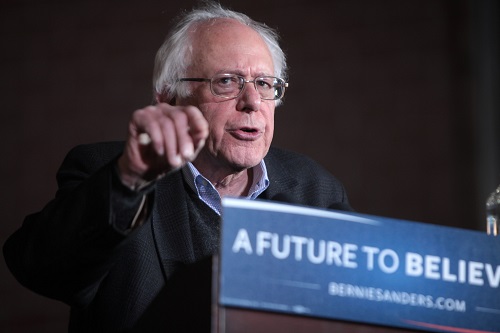Senator Bernie Sanders has refused to grapple with the fact that socialist governments regularly suppress human rights and devolve into despotism, according to a social democrat from Germany. Even as Sanders proposed an economic “Bill of Rights” this week, he ignored the fact that civil liberties depend on preserving “private economic initiative,” the political scientist said.
In a major speech on Wednesday afternoon, Sanders invited his audience to “ask yourself: what does it actually mean to be free?” Then he recited a litany of economic uncertainty:
Are you truly free if you are unable to go to a doctor when you are sick, or face financial bankruptcy when you leave the hospital? …
Are you truly free when you spend half of your limited income on housing, and are forced to borrow money from a payday lender at 200% interest rates.
Are you truly free if you are 70 years old and forced to work because you lack a pension or enough money to retire? …
Are you truly free if you are forced to work 60 or 80 hours a week because you can’t find a job that pays a living wage?
Are you truly free if you are a mother or father with a newborn baby but you are forced to go back to work immediately after the birth because you lack paid family leave?
Are you truly free if you are a small business owner or family farmer who is driven out by the monopolistic practices of big business?
“Economic rights are human rights,” Sanders intoned. “That is what I mean by democratic socialism.”
He concluded by calling for:
A Bill of Rights that establishes once and for all that every American, regardless of his or her income, is entitled to:
- The right to a decent job that pays a living wage
- The right to quality health care
- The right to a complete education
- The right to affordable housing
- The right to a clean environment
- The right to a secure retirement
But a political scientist who sang socialist anthems in his native Germany said he wanted to see evidence that Sen. Sanders understands the link between concentrated economic and political power.
“All four of my grandparents were sent to prison for their socialist convictions at some point in the 1920s or 1930s,” wrote Yascha Mounk in The Atlantic. “As a young activist in the Jusos, the youth organization of Germany’s Social Democratic Party, I sang along wholeheartedly when my comrades would intone ‘The Internationale’ at the end of rallies, rounding off each rendition with a loud shout of ‘Long live socialism and liberty!’”
Having established his leftist bona fides, Mounk – who is an associate professor at Johns Hopkins University and a senior fellow at the German Marshall Fund – wrote that Sanders “didn’t acknowledge … the ways in which the suppression of free markets has repeatedly fostered a different kind of oppression over the past century.”
The difference between those who “ended up crushing political opponents” and those “who respected the right to dissent, was in good part their attitude toward markets.” Mount continued:
Socialists who nationalized large parts of the economy, and severely restricted the functioning of the market, crushed freedom in two ways: First, they made it impossible for citizens to engage in private economic initiative. And second, they quickly started to abuse the power to take away the livelihood of political opponents.
This history makes it all the more important for Sanders to be clear on the kind of role that he envisages for the market in the society he is setting out to create.
Instead, Sanders was “downright disdainful of the notion” that anything except conservatism could result in dictatorship.
“The speech Sanders gave was not serious,” Mounk wrote.
Mounk further expounded during an interview last October that trying to implement European social democracy “would change the character of the United States quite a lot.” Furthermore:
If you mean what had traditionally been meant by socialism, collective ownership of the means of production, I can only say I have yet to see a society in history that has managed to sustain that without falling into a deeply repressive dictatorship. So I think there are robust measures we can take in that direction that don’t require us to abolish capitalism or be blind to the incredible generative power of markets.
None of them were on display in Sanders’ speech, nor his Medicare for All proposal, which would end private insurance.
The Founding Fathers wondered in Federalist 51 if the Constitution they established had reserved enough power in private hands for the government to “control itself.”
If Mounk, a product of the European social democracy left, questions whether Sanders’ economic proposals could deny vital liberties, how much more should those of us who believe (in Pope John Paul II’s phrase) that “human nature” is “made for freedom”?
(Photo credit: Gage Skidmore. CC BY-SA 2.0.)
